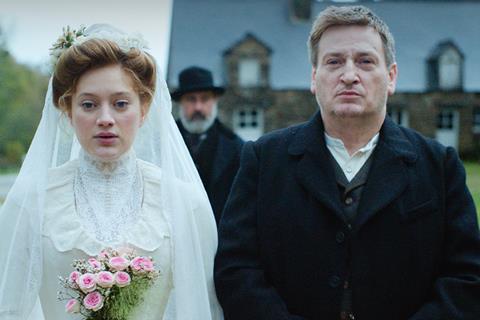Delicate drama about a bearded woman who refuses to accept social beauty standards in 1870s France

Dir: Stephanie Di Giusto. France. 2023. 111mins.
Drawing inspiration from a true story, French director Stephanie Di Giusto’s second feature champions a woman who refusea to conform to society’s restrictive beauty standards, proudly flaunting a full beard for all to see. Nadia Tereszkiewicz is terrific in Rosalie, playing the title role with charm and grace as a new bride unconcerned that her husband (Benoit Magimel) is shocked by her excessive body hair: as far as she’s concerned it is his problem, not hers. This delicate drama has plenty of applications to modern times — not least of all in its appeal for tolerance of others’ differences — but the film works best as a quiet study in accepting oneself.
Rosalie is critical of how women are expected to look and behave in order to be considered ’desirable’
Di Giusto returns to Un Certain Regard, where her 2016 debut The Dancer also premiered. Warm reviews, especially for Tereszkiewicz, should help the commercial cause, and the picture’s feminist message and understated love story will appeal to discriminating arthouse connoisseurs.
Rosalie takes place in the 1870s in a small French community, where Rosalie (Tereszkiewicz) is about to wed Abel (Magimel), a cafe owner who is drowning in debt and desperate for the dowry this marriage will provide. What he doesn’t know is that Rosalie has to constantly shave her face to conceal her hairiness, which extends across her whole body. When Abel discovers her secret, he is repulsed. After Rosalie lets go of her embarrassment, she decides that if she grows her beard, it might attract curious customers to his bar. Sure enough, her gambit is successful, although Abel remains wary of his new bride.
As with The Dancer, Di Giusto uses actual events to focus on an idiosyncratic soul who doesn’t entirely fit in the conventional world. But Rosalie is hardly a dour tale of prejudice: for most of its runtime, the film is actually quite open-hearted as the townspeople come to enjoy Rosalie’s presence, even if they’re initially alarmed at the sight of her beard. This is not a picture of stirring speeches and showboating dramatic moments. Instead, it is guided by Tereszkiewicz’s utterly winning turn as Rosalie, who slowly gains confidence after she lets her whiskers grow.
There is a romantic element as Abel begins to fall for Rosalie, but it is telling that Di Giusto never spends time having her heroine convince her husband that she’s a worthy partner. Rosalie is notably independent — in some ways, she really wants a child more than she wants a man — and one of the film’s steady pleasures is waiting for Abel to finally get over his hang-ups and embrace his wonderful wife. If Tereszkiewicz is radiant, Magimel is more withdrawn, playing a man who is physically imposing but otherwise rather small and ineffectual. The actor capably navigates Abel’s mixture of shame and anger, but Magimel also makes room for the character’s inherent decency. Many in the town will quickly come to love Rosalie — especially the girls in a local orphanage, who admire her — and eventually Abel will, too.
Hania Rani’s strings-and-piano score is as airy and bright as Rosalie’s personality, but dark clouds appear on the horizon once a miserly rich local businessman (Benjamin Biolay) – to whom Abel owes a lot of money – comes to dislike Rosalie, disapproving of her flaunting her sexuality in ways he deems inappropriate because of her beard. Soon the film gets bogged down in plot complications meant to gin up the stakes, as well as underline how bigotry can be like a virus infecting a community, but Di Giusto is on stronger footing when she’s simply celebrating Rosalie’s indomitable spirit.
Although Rosalie is critical of how women are expected to look and behave in order to be considered ‘desirable’, the story is nonetheless guided by a resilient optimism. Abel is concerned that Rosalie’s hirsute appearance will make her an oddity among his closed-minded clientele, but the opposite proves true: most are impressed that she is willing to be herself. In due course, we will learn just how much Rosalie actually struggles with her appearance — and, also, how she and Abel find common ground in the fact that they each have body issues. (He has permanent scars and injuries from the war.) But without being didactic or pollyannaish, Rosalie turns a trite truism into something resonant: we are all more alike than we are different.
Production companies: Tresor Films, Gaumont, Laurent Dassault Rond-Point, Artemis Productions
International sales: Gaumont, manuel.pereira@gaumont.com
Producer: Alain Attal
Screenplay: Stephanie Di Giusto and Sandrine Le Coustumer, based on a treatment by Sandrine Le Coustumer and Alexandra Echkenazi
Cinematography: Christos Voudouris
Production design: Laurent Ott
Editing: Nassim Gordji-Tehrani
Music: Hania Rani
Main cast: Nadia Tereszkiewicz, Benoit Magimel, Benjamin Biolay







![The Brightest SunScreen[Courtesy HKIFF]](https://d1nslcd7m2225b.cloudfront.net/Pictures/274x183/3/5/0/1448350_thebrightestsunscreencourtesyhkiff_312678.jpg)














![The Brightest SunScreen[Courtesy HKIFF]](https://d1nslcd7m2225b.cloudfront.net/Pictures/100x67/3/5/0/1448350_thebrightestsunscreencourtesyhkiff_312678.jpg)

